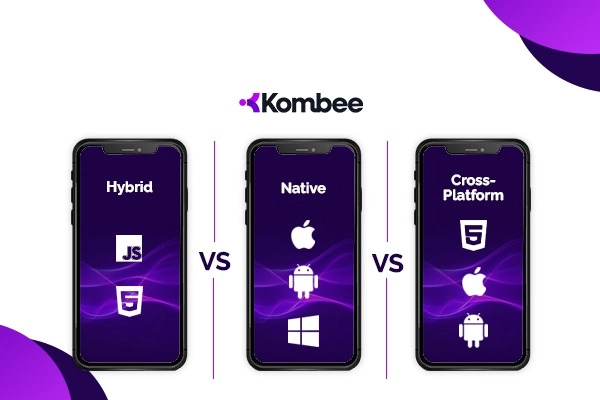Introduction
Think about whether you could develop an app and deploy it on iOS and Android without losing user experience or performance. With smartphone mobile network subscriptions worldwide forecasted to reach more than 7.7 billion by 2028, having an app that runs well on iOS and Android is essential to get the best possible user base and interaction.
Hybrid apps offer a practical solution by combining the strengths of both worlds—native and web technology—to deliver high-performing, cross-platform hybrid mobile apps. With modern hybrid app development, you get the flexibility of web technologies with near-native performance and scalability.
In this blog, let us see why hybrid apps are your best choice for cross-platform mobile app development, especially when efficiency and reach matter. Whether you're building a new product or expanding, hybrid application development offers unmatched value.
1. Achieve Cross-Platform Compatibility For Extending Your Market Reach
Problem: Companies usually struggle with creating different apps for iOS and Android, which is time-consuming and expensive. This effort duplication restricts their capacity to target a broader market effectively.
Solution: Hybrid apps solve this problem by enabling developers to code once and deploy across platforms. Modern hybrid app development frameworks like React Native and Flutter support robust hybrid mobile app development, letting teams build scalable apps with ease. This efficient approach is the foundation of effective hybrid apps development.
How It Works:
- React Native: It employs JavaScript and React to create apps that can run on iOS as well as Android. It translates JavaScript code into native components, so the app appears and functions like a native app on both platforms.
- Flutter: It utilizes the Dart programming language and includes a vast set of pre-defined widgets, which are highly customizable. Apps in Flutter are natively compiled for iOS and Android, maintaining good performance.
Advantages:
- Increased Reach: By distributing one app over more platforms, companies can target more customers without doubling their efforts.
- Efficient Resource Allocation: This approach allows businesses to allocate resources more efficiently, focusing on a single development process rather than managing separate teams for each platform.
2. Achieve Cost-Effectiveness For Reducing Development Costs
Problem: Developing and building separate native apps for iOS and Android can be costly due to the need for different development teams and technologies.
Solution: Hybrid apps save on development expenses through a shared codebase across platforms. This prevents the necessity for independent development teams and shortens the overall mobile app development period.
How It Works:
- Shared Codebase: The code is written once using web technologies particularly HTML, CSS, and JavaScript and then wrapped in a native container to execute on both iOS and Android.
- Frameworks and Tools: Frameworks such as Ionic use web technologies like HTML, CSS, and JavaScript to develop hybrid applications, making it simple for web developers to transition into mobile hybrid app development. This cost-effective method lies at the heart of modern hybrid application development.
Advantages:
- Cost Savings: Companies incur less development costs by avoiding the need for different teams for each platform.
- Faster Development: Utilization of a single codebase makes the mobile app development process faster, enabling companies to roll out their apps earlier.
3. Achieve Faster Development and Time to Market
Problem: Due to lengthy development cycles, companies find it difficult to respond quickly to market needs.
Solution: Hybrid app development accelerates the build process by using familiar web tools. A skilled hybrid app developer can leverage frameworks like React Native and Flutter to shorten timelines, allowing for agile iteration. Businesses that embrace hybrid apps development gain faster time to market and a competitive edge.
How It Works:
- Web Technologies: Hybrid apps rely on web technologies such as HTML, CSS, and JavaScript, which are familiar to most developers. This commonality accelerates the mobile app development cycle.
- Agile Development: Frameworks like React Native and Flutter support agile development methodologies, allowing rapid prototyping and iteration.
Advantages:
- Rapid Deployment: Businesses can quickly launch their apps and respond to market demands ahead of competitors.
- Competitive Advantage: Faster time to market allows businesses to capture market share early and establish a strong presence.
4. Unified User Experience For Enhancing Engagement and Satisfaction
Problem: It can be challenging to provide a uniform user experience on multiple platforms, and this can cause users to become dissatisfied and less engaged.
Solution: A hybrid mobile app provides a consistent interface and seamless experience across iOS and Android platforms. With a shared codebase, businesses can ensure that their app behaves uniformly, boosting satisfaction and trust.
How It Works:
- Uniform Design: Hybrid apps operate with a single design pattern on all platforms, making the app appear and behave uniformly on iOS and Android.
- Shared Codebase: A shared codebase enables uniform functionality and user interface components, promoting user familiarity and satisfaction.
Advantages:
- User Engagement: Uniform user experience increases engagement and satisfaction, increasing loyalty and repeat usage.
- Brand Consistency: Companies can have a uniform brand presence on different platforms, strengthening their brand identity.
5. Get Easy Updates and Maintenance For Simplifying User Convenience
Problem: It can be time consuming and also inconvenient to manage updates on different platforms, which might need to be done manually by downloading new versions.
Solution: Hybrid mobile apps simplify updates by allowing developers to make changes in one codebase and roll them out to both platforms simultaneously. This centralized management makes maintenance faster and more efficient.
How It Works:
- Single Codebase: Changes are introduced to the common codebase, and updates are rolled out automatically to all platforms.
- Over-the-Air Updates: Some frameworks support over-the-air updates, allowing users to receive updates without downloading new versions manually.
Advantages:
- User Convenience: Users benefit from automatic updates, ensuring they can access the latest features and bug fixes without manual intervention.
- Efficient Maintenance: Businesses can manage updates more efficiently, decreasing the complexity and cost of maintaining separate apps for each platform.
6. Access to Device Features For Enhancing App Functionality
Problem: Companies usually require apps that have access to native device functionality, such as cameras and GPS, but web applications do not support this.
Solution: Through hybrid app development, companies can access device-native features using plugin systems like Cordova. Hybrid apps can tap into cameras, GPS, push notifications, and more — delivering native-like capabilities from a single codebase.
How It Works:
- Plugins: Platforms like Cordova offer plugins to provide hybrid apps with access to native device features. These plugins serve as connectors between web technologies and native APIs.
- Native Integration: Hybrid apps can integrate with native elements, allowing them to utilize device capabilities that would otherwise be unavailable to web apps.
Advantages:
- Improved Functionality: Companies can create apps with high functionality that are on par with native apps by being able to access device capabilities.
- User Experience: Having the capacity to leverage native capabilities improves the user experience, making hybrid apps more engaging and beneficial.
7. Offline Functionality For Meeting Multiple User Needs
Problem: Users might need to access application features without an internet connection, limiting the use of web-based apps.
Solution: Hybrid apps can provide offline capabilities by employing local storage and caching techniques.
How It Works:
- Local Storage: Hybrid apps can locally store data within the device so users can view previously loaded information without internet connectivity.
- Caching: Apps can cache commonly used resources so that users can perform some operations offline.
Advantages:
- Convenience for Users: Users can use the app in different environments without a stable internet connection.
- Improved User Experience: Offline capability provides an uninterrupted user experience, irrespective of network availability.

Conclusion
Hybrid mobile apps offer a smart, scalable solution for businesses aiming to deploy applications across multiple platforms. With hybrid app development, you get faster time to market, lower costs, and broader reach all without compromising on user experience.
Looking for a reliable hybrid app developer? At Kombee, we specialize in hybrid apps development that brings together performance, design, and functionality to help your business grow.
Frequently Asked Questions
1. Why is mobile-first design important for eCommerce websites?
Mobile-first design ensures that your website functions smoothly on smartphones, which now account for most online shopping traffic. Without a mobile-optimized site, you risk losing more than half of your potential customers.
2. How does website speed impact eCommerce sales?
A slow-loading eCommerce site increases bounce rates and cart abandonment. Fast websites build trust, improve the shopping experience, and directly increase conversion rates.
3. What are trust signals in eCommerce web design?
Trust signals include SSL certificates, secure payment badges, customer reviews, and transparent return policies. These reassure customers that their data and money are safe, reducing hesitation at checkout.
4. How can personalization improve eCommerce conversions?
Personalized recommendations, custom banners, and dynamic content based on user behavior make shoppers feel valued. This improves engagement, boosts average order value, and encourages repeat purchases.






